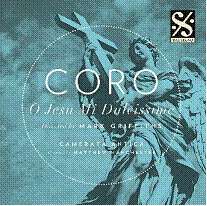|
Back
06/10/2012
Heinrich Schütz: Wie lieblich sind Deine Wohnungen – Alleluia! Lobet den Herren – Selig sind die Toten
Giovanni Gabrieli: O magnum mysterium – Canzone II à 6 – Omnes gentes plaudit manibus – O Jesu mi dulcissime
Claudio Monteverdi: Cantate Domino – Beatus vir
Nicolò Corradini: Prospera lux venit – O Jesu mi dulcissime
Andrea Gabrieli: O sacrum convivium
Coro - Soloists: Cat Paterson, Jo Golden (soprano), Sarah Clarke, Rachel Jeremiah, Camilla Fawkner (alto), Michael Jeremiah, Jonathan Mayes, Joseph Denby (tenor), Richard McElwaine, Robin Paterson, Tim Reader (bass), Mark Griffiths (conductor)
Camerata Antica: Matthew Manchester (conductor, cornetto), Russel Gilmour, Nicholas Wright (cornetto), Martyn Sanderson, Daniel Serafini, Hilary Belsey, Guy Morley (sackbutt)
Recorded at St. Mary-at-Hill, London (October 2011) – 62’35
Dal Segno Records DSPRCD602 – Booklet in English with program notes, texts and biographies

   
Coro, a London based chamber choir, was formed in September 2000. In 2002 Mark Griffith took the helm as Coro’s Music Director and led the ensemble to considerable success on the competition circuit. Already three years after their formation, Coro was the first Western European Choir to win the Grand Prix at the Tallinn International Choral Competition. In 2007 Coro took both the Renaissance Music and the Twentieth Century Music prize at the 54th International Polyphonic Competition “Guido d’Arezzo” in Italy. 2010 Coro was a finalist of the Florilège Vocal de Tours, France, winning the competition’s special Renaissance prize. After “The Lover’s Ghost” and “This Christmas Night”, the present O Jesu Mi Dulcissime is Coro’s 3rd album on the Dal Segno record label.
For this recording Coro selected polychoral music from the late Renaissance and early Baroque era. Works by Heinrich Schütz alternate with music by Giovanni and Andrea Gabrieli, Claudio Monteverdi and Nicolò Corradini. For this album they teamed up with the recently formed ensemble Camerata Antica, directed by Matthew Manchester. A period instrument consort with a flexible lineup, the formation used in this recording consists of an ensemble of cornets and sackbutts. Cornets are hybrid wind/ brass instruments, much like a recorder, but with a horn mouthpiece. Sackbutts are the predecessors of the modern trombone. The name derives from the Old French “saqueboute” with “saquer” meaning to pull and “bouter” to push.
Already with the first chords of Schütz’s Wie Lieblich sind Deine Wohnungen it becomes apparent that this is a CD out of the ordinary. “Coro”, consisting of 30 highly experienced amateur choristers, fascinates with a fresh, not artificial sound. There is something immediate and natural about their singing. The solo parts in Schütz’s Alleluja sound unpretentiously convincing. The diction, whether in German or Italian, is consistently good, and the intonation mostly excellent. Monteverdi’s joyous Cantate dominum and dance-like Beatus vir with its contrasting rhythmic patterns show off Coro’s virtuosic potential.
The two instrumental pieces, Giovanni Gabrieli’s Canzona II a 6 and Andrea Gabrieli’s reflective O sacrum convivium, impressively showcase the warmth and naturalness of the cornets and sackbutts. If one is used to listening to modern instruments, the intonation may seem slightly off at times.
The CD’s booklet is edited with great care. David Benedict and Mark Griffith provide short but informative introductions to every piece. Every song text has an English translation.
A welcome addition for early music buffs!
The Coro website
The Camerata Antica website
Wiebke Kuester
|